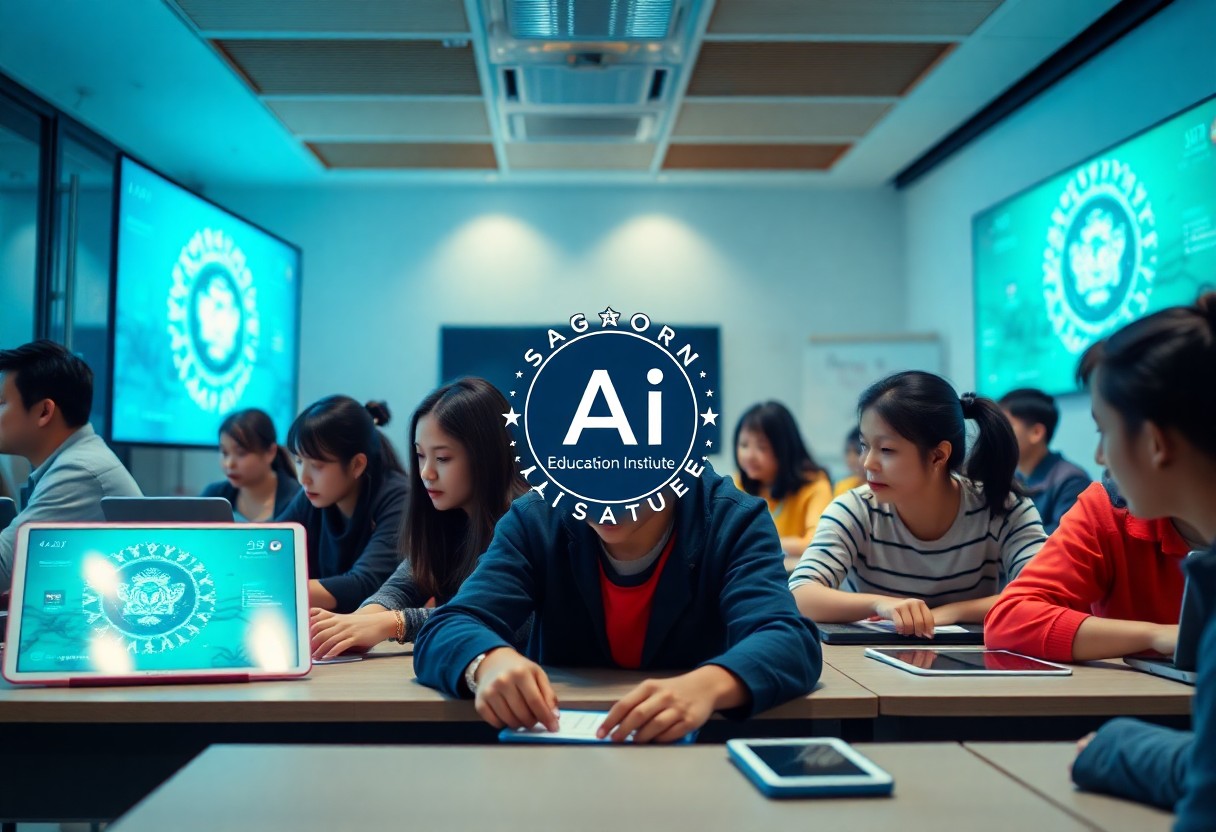Many educators and learners are turning to innovative resources to stay ahead in the rapidly evolving landscape of artificial intelligence. By leveraging initiatives from the Singapore AI Education Institute, you can access a range of cutting-edge learning solutions designed to enhance your skills and knowledge in AI. This post will guide you through practical steps to effectively utilize these resources, enabling you to transform your educational experience and achieve your learning objectives with advanced technologies.
Key Takeaways:
- Innovation: Engage with the latest research and development initiatives at the Singapore AI Education Institute to stay ahead in technology-driven learning solutions.
- Collaboration: Form partnerships with the institute to access cutting-edge resources and expertise, fostering a more enriched learning environment.
- Curriculum Enhancement: Integrate AI-focused content and methodologies from the institute to modernize and enhance existing educational programs.
- Professional Development: Take advantage of workshops and training sessions offered by the institute to upskill educators in AI and technology integration.
- Community Engagement: Leverage community initiatives and projects driven by the institute to promote collaborative learning and real-world applications of AI in education.
Understanding the Singapore AI Education Institute
Overview of the Institute
The Singapore AI Education Institute (SAIEI) has emerged as a leader in integrating artificial intelligence into educational frameworks. With a mission to advance AI readiness among learners and educators, the institute emphasizes the importance of developing skills and knowledge tailored to the evolving landscape of technology. By fostering an environment of innovation, SAIEI prepares you to explore the transformative potential of AI in various sectors, including education, healthcare, and finance.
Some of the key goals of the institute include promoting AI literacy, nurturing research, and building a collaborative ecosystem of educators and industry professionals. Through a combination of hands-on training, workshops, and community engagement, SAIEI equips you with the necessary tools to thrive in a technology-driven world. The institute not only provides resources for students but also actively supports educators in their quest to integrate AI into their teaching methodologies.
Key Initiatives and Programs
Initiatives at the Singapore AI Education Institute are designed with a focus on practical application and real-world impact. SAIEI offers various programs that cater to different skill levels, ranging from beginner-friendly courses to advanced workshops aimed at those already well-versed in technology. Topics covered include machine learning, data analytics, and AI ethics, ensuring a comprehensive understanding of the subject matter.
A notable aspect of SAIEI’s offerings is its emphasis on collaboration with other educational institutions and industry leaders. By participating in hackathons, research projects, and internships, you gain valuable experience and insight into the practical applications of AI. These initiatives are tailored to not just educate but empower you to leverage your skills in meaningful ways, ultimately enriching your personal and professional growth.

Identifying Cutting-Edge Learning Solutions
Now that you are aware of the transformative potential of the Singapore AI Education Institute, it’s time to explore into the aspects that define cutting-edge learning solutions. Identifying these solutions starts with understanding their characteristics, which help them stand out in today’s rapidly evolving educational landscape. The foremost characteristic is adaptability; effective learning solutions need to cater to diverse learning styles and environments, allowing for personalized learning experiences. Moreover, they must leverage technology to create interactive and engaging methods that keep learners motivated and excited about their education.
Characteristics of Effective Learning Solutions
On top of adaptability, effective learning solutions are data-driven. They use analytics to gauge educational outcomes, helping you assess not only learners’ progress but also the overall effectiveness of the programs in place. Another necessary characteristic is scalability; the solution should be able to accommodate a growing number of users without compromising the quality of learning experiences. By focusing on these traits, you can ensure that the learning solutions you implement are not just effective but also sustainable in the long run.
Importance of AI in Education
CuttingEdge advancements in artificial intelligence (AI) are reshaping the educational sphere, providing unprecedented opportunities for enhancing how you learn and teach. AI can analyze vast amounts of data, enabling personalized learning paths that cater to individual strengths and weaknesses. This capability enhances student engagement and retention, as each learner progresses at their own pace, thereby making education more inclusive and impactful.
With the integration of AI in education, your approach to learning solutions can drastically shift from one-size-fits-all methodologies to bespoke strategies tailored to individual learners. By harnessing AI-driven analytics, you gain insights into various learning behaviors, allowing you to make informed decisions that elevate educational outcomes. Moreover, AI tools can assist educators by automating administrative tasks, thereby freeing up more time to focus on teaching and mentoring students, which ultimately leads to a more effective learning environment. Embracing these AI initiatives opens doors to innovative learning solutions that can redefine educational experiences for the better.
How to Leverage AI Education Initiatives
Keep in mind that leveraging initiatives from the Singapore AI Education Institute can significantly enhance your educational strategy. By embracing these programs, you can stay ahead in the rapidly evolving educational landscape and ensure your students are equipped for the challenges of tomorrow.
Aligning Educational Goals with AI Initiatives
If you want to successfully integrate AI into your educational framework, you need to begin by aligning your educational goals with the initiatives offered by the Singapore AI Education Institute. This involves assessing your current curriculum and identifying areas where AI can provide tangible benefits. You may consider factors such as enhancing engagement, personalizing learning experiences, and preparing your students for a technology-driven world.
If you intentionally map out the objectives of AI initiatives to your institution’s mission, you can create a seamless transition into AI-enhanced learning. Collaborating with the institute’s experts can provide you insights on current trends and future projections in AI education that can help shape your objectives and desired outcomes. This alignment will ultimately optimize the effectiveness of the AI tools you choose to implement, and ensure they serve your educational intentions well.
Integrating AI Tools into Curriculum
Integrating AI tools into your curriculum might seem daunting at first, but with a structured approach, you can make it a smooth process. Begin by exploring various AI platforms and tools offered through the Singapore AI Education Institute. These resources are designed to enrich your teaching methods and enhance students’ learning experiences, making complex subjects more accessible and engaging.
Understanding the versatility of AI tools means you can tailor them to fit your numerous teaching styles and subject areas. Whether it’s through adaptive learning platforms that personalize study materials for individual students or AI-generated assessments that provide immediate feedback, these technologies can elevate the academic experience for both educators and learners. You will find that integrating AI into your curriculum not only meets educational goals but also ignites curiosity and motivation among your students.
Utilizing Resources and Training Programs
Tools and resources provided by the Singapore AI Education Institute can support your journey towards AI integration in education. The institute offers a variety of training programs that cater to different skill levels, allowing you to choose the most suitable option for your teaching team. By participating in these programs, you will gain firsthand knowledge of how AI can change traditional teaching methods, equipping you with the skills to lead your students into the future of learning.
Another important aspect to consider is that these training programs also encourage collaboration and networking with fellow educators. Sharing experiences and best practices can deepen your understanding of AI in education. Attending workshops or webinars can introduce you to innovative ways to implement AI in your curriculum, making the most out of available resources while fostering a community of informed educators dedicated to excellence in learning solutions.
Tips for Successful Implementation
All successful initiatives require a well-thought-out plan, especially when leveraging AI in education. To ensure a smooth implementation of the Singapore AI Education Institute’s initiatives, consider the following tips:
- Engage with stakeholders including educators, students, and parents to gain insights and foster collaboration.
- Invest in comprehensive training for educators to build their confidence and familiarity with AI tools.
- Develop clear communication channels to keep all parties informed and involved throughout the implementation process.
- Continuously assess resources and support systems to meet the needs of all learners effectively.
- Set realistic benchmarks and goals to measure progress and success as you navigate the implementation journey.
Thou will find that a strategic approach is crucial for maximizing the benefits of AI-enhanced learning solutions.
Engaging Stakeholders and Educators
Clearly, engaging stakeholders and educators is vital for the successful implementation of any educational initiative. Start by involving them in the planning phase to give them a sense of ownership and investment in the process. This approach not only encourages cooperation and collaboration but also helps identify potential challenges early on, allowing for timely resolutions.
You should also provide platforms for ongoing feedback from stakeholders and educators. This ensures that their voices are heard and that the implementation can be adjusted to meet the needs of both instructors and students. By fostering an environment of open communication, you can enhance the overall effectiveness of the initiatives.
Ensuring Accessibility for All Learners
Clearly, it is crucial to ensure that AI-driven learning solutions are accessible to all learners, including those with special needs or varying learning styles. By prioritizing accessibility, you promote an inclusive educational environment that allows everyone to engage effectively with the content. This may involve the integration of various assistive technologies and differentiated instructional strategies that cater to the unique requirements of each student.
Moreover, obtaining feedback from diverse learner cohorts can help identify barriers and areas for improvement. Your commitment to accessibility will foster a more equitable learning landscape, enriching the educational experience for all involved.
Successful collaborations with accessibility experts can also enhance the inclusion of AI learning tools. By consulting with specialists, you can identify features that support diverse learners, ensuring that no one is left behind in the digital learning experience.
Measuring the Effectiveness of AI Solutions
Educators must prioritize the measurement of the effectiveness of AI solutions to gauge their impact on student learning outcomes. This involves establishing clear metrics and data collection methods early in the implementation process. By utilizing data analytics tools, you can track student engagement, performance trends, and feedback from both learners and educators alike.
Furthermore, it’s important to analyze both qualitative and quantitative data to paint a comprehensive picture of how AI initiatives are performing. By regularly assessing the effectiveness of these solutions, you can make informed adjustments and enhancements, ensuring that the technology is truly enriching the learning experience.
Effectiveness should always be the focal point of your evaluation process. By benchmarking against set goals and adapting your approach based on data-driven insights, you can continually refine AI implementations to meet the evolving needs of your educational environment.
Factors Influencing AI Adoption in Education
Once again, it’s necessary to recognize the various factors that can influence the successful adoption of AI in educational settings. By understanding these aspects, you can better navigate the complexities and drive positive outcomes in your institution. Below are critical considerations that can impact AI integration:
- Institutional Support and Infrastructure
- Faculty Readiness and Professional Development
- Student Engagement and Adoption Rates
Knowing these factors can help you create a strategic plan for implementing AI initiatives effectively.
Institutional Support and Infrastructure
On your journey to leveraging AI in education, institutional support and appropriate infrastructure are foundational elements. Ensuring that the administration acknowledges the significance of AI and provides the necessary resources can dramatically affect successful integration. Creating a collaborative environment that engages various stakeholders—such as faculty, students, and parents—can facilitate the smooth adoption of AI-driven solutions. Moreover, investing in the required technological infrastructure, such as high-speed internet and modern devices, can enable widespread accessibility and functionality.
Furthermore, you should advocate for policies that prioritize AI education initiatives. Institutions that actively promote research and encourage pilot programs related to AI can establish an ecosystem where innovation thrives. Effective communication channels and feedback mechanisms also play a critical role in ensuring that the infrastructural needs align with pedagogical goals.
Faculty Readiness and Professional Development
An necessary factor influencing AI adoption in education is the readiness of your faculty members. Their ability to understand and effectively use AI technologies can make a significant difference in the success of implementation. Faculty must be provided with ongoing professional development opportunities to familiarize themselves with AI tools and methods. The more your educators engage with AI, the more adept they will become at integrating it into their teaching practices, ultimately enhancing the learning experience for students.
Without adequate training and support, faculty members may feel overwhelmed or resistant to adopting new technologies. As such, establishing a comprehensive professional development program that addresses AI-focused training can improve staff confidence and competence in employing AI solutions in their curriculum.
Infrastructure investments are only as effective as the individuals operating them. Therefore, instituting mentorship programs that allow experienced faculty to guide their peers through the learning curve of AI adoption can create a more collaborative atmosphere, fostering shared learning and growth.
Student Engagement and Adoption Rates
For AI initiatives to succeed, student engagement and adoption rates are vital metrics to consider. You must ensure that the AI tools being implemented resonate with your learners and cater to their unique educational needs. Conducting surveys or focus groups can help you gather insights about student preferences and experiences with technology in their educational journey. By actively involving students in decision-making processes surrounding AI tools, you can cultivate a sense of ownership and facilitate quicker adoption.
Moreover, tracking the engagement levels of students using AI-driven solutions can help you make informed decisions about their effectiveness. A data-driven approach enables you to adjust strategies and tailor interventions that enhance the learning experience, ensuring that the AI initiatives remain relevant and impactful for your students.
With continuous feedback from students, you can refine the methodologies employed in AI education, thereby enhancing participation rates and engagement levels. By prioritizing student needs and preferences, you can build a more robust framework for AI adoption that fosters a culture of innovation and collaboration within your educational institution.
Overcoming Challenges in AI Integration
Not every initiative you encounter in AI education will seamlessly fit into your existing framework. Successfully integrating AI requires a thoughtful consideration of the unique challenges that arise, especially in the realms of technology and ethics. The Singapore AI Education Institute offers valuable resources, but you will still need strategies to navigate these complexities and ensure the benefits of AI reach your educational goals.
Addressing Technological Barriers
Assuming you have a clear understanding of the AI tools and platforms available, you may still face significant technological barriers that can obstruct effective integration. It’s important first to assess your current digital infrastructure and determine if it can support the advanced functionalities of AI systems. If your resources are limited, consider gradually integrating AI components into your educational offerings instead of a full-scale implementation. This approach allows you to acclimate to the technology while minimizing disruption.
Furthermore, investing in training for your staff and students is a must. Ensuring that they are equipped with the skills to utilize AI tools effectively will enhance their experiences and outcomes. Collaboration with tech companies or local educational institutions can provide you with the necessary support and insights needed to overcome these technological challenges.
Navigating Ethical Considerations
Technological advancement always comes with its own set of ethical issues that you need to navigate carefully. As you implement AI initiatives, you may encounter challenges related to data privacy, algorithmic bias, and transparency. It’s important to establish clear guidelines and governance structures to address these concerns from the outset. Being proactive in these areas not only protects your stakeholders but also fosters a sense of trust in the AI systems you implement.
It’s important to facilitate open discussions among your team and students about the ethical implications of AI. By fostering an environment where these topics are addressed, you can cultivate a more informed and responsible approach to AI usage. Additionally, consider forming an ethics committee or collaborating with experts, which can further enrich your understanding and response to potential ethical dilemmas.
Building a Sustainable AI Framework
Sustainable AI integration focuses on creating an enduring infrastructure that adapitates to evolving technology and educational needs. As you develop your AI initiatives, it’s important to design a framework that not only meets current demands but also anticipates future growth and changes in learning environments. A key aspect of this is continuous evaluation and iteration on your designed systems and practices.
Frameworks should be dynamic, allowing room for enhancements as AI technology advances. Additionally, involving stakeholders in the development of your AI strategy ensures that the system remains relevant and aligned with your educational goals. By engaging the opinions and suggestions of educators, students, and community members, you create a more sustainable initiative that is responsive to the community it serves.
Best Practices for Continuous Improvement
For effective learning solutions, it’s crucial to embrace ongoing improvements. By leveraging initiatives from the Singapore AI Education Institute, you can consistently refine your approach to delivering educational content. This process involves integrating the latest findings and methodologies from the field of artificial intelligence to ensure that your strategies remain current and impactful.
Keeping Up with AI Trends and Advancements
Practices for staying informed about AI trends and advancements can greatly enhance your learning solutions. Engaging with research papers, attending relevant conferences, and joining online forums dedicated to AI can keep you at the forefront of developments. By doing this, you not only enhance your own understanding but also inspire your students with the latest insights from the AI community.
Fostering Collaboration and Community Learning
Now is the time to establish a culture of collaboration within your learning environment. By encouraging partnerships among educators, students, and industry experts, you create a community that fosters shared knowledge and experiences. This collaborative spirit can lead to innovative AI applications and pedagogical strategies that benefit all participants.
A strong community learning framework allows for the exchange of ideas and resources. You can set up regular workshops, discussion panels, or group projects that emphasize teamwork and shared learning objectives. In doing so, you create an environment where diverse perspectives merge, enriching the educational experience for everyone involved.
Iterative Feedback Loops for Curriculum Enhancement
The implementation of iterative feedback loops is a powerful method for refining your curriculum. By seeking input from students, educators, and industry professionals, you can identify areas that require improvement and make adjustments promptly. This ongoing dialogue ensures that your programs remain relevant and effective in teaching the principles of AI.
Collaboration among stakeholders is key to establishing these feedback loops. You might consider using surveys, focus groups, or one-on-one interviews to gather meaningful insights. These continuous feedback mechanisms not only improve the curriculum but also demonstrate your commitment to delivering quality education tailored to the needs of your learners.
Final Words
Ultimately, leveraging initiatives from the Singapore AI Education Institute can significantly enhance your approach to cutting-edge learning solutions. By tapping into the wealth of resources, training programs, and partnerships offered by the institute, you position yourself at the forefront of AI and education integration. Engaging with these initiatives not only enriches your skill set but also empowers you to implement innovative strategies that can transform learning environments, facilitating better outcomes for your learners.
As you explore the collaborative opportunities and advanced learning frameworks provided by the Singapore AI Education Institute, you will find that your capacity to drive change within your educational practice will broaden remarkably. Embrace these resources to not only boost your personal and professional growth but also to contribute meaningfully to the larger educational landscape. Thus, with a proactive mindset, you can harness the full potential of AI advancements, ensuring that your learning solutions remain relevant and impactful.
FAQ
Q: What initiatives does the Singapore AI Education Institute offer for enhancing educational practices?
A: The Singapore AI Education Institute provides various initiatives including workshops, online courses, and collaborative projects that focus on integrating artificial intelligence into education. These programs are designed to equip educators with the skills and knowledge needed to implement AI-driven learning solutions, thereby enhancing pedagogical practices and student engagement.
Q: How can educators apply AI tools learned through the Singapore AI Education Institute in their classrooms?
A: Educators can utilize AI tools learned through the institute by developing personalized learning experiences for students. By analyzing data collected from student interactions, teachers can tailor educational content to meet individual learning needs. Furthermore, AI can assist in automating administrative tasks, allowing educators to dedicate more time to direct instructional support.
Q: Are there opportunities for collaboration with other educators or institutions through the Singapore AI Education Institute’s programs?
A: Yes, the Singapore AI Education Institute encourages collaboration among educators and institutions. Through networking events, joint projects, and collaborative research opportunities, participants can share best practices and experiences, fostering a community that enhances the overall learning landscape through collective efforts.
Q: What resources are available for educators interested in implementing AI-driven solutions in their curriculum?
A: The Singapore AI Education Institute offers a range of resources, including access to research studies, teaching materials, and case studies showcasing successful implementations of AI in education. Additionally, educators can participate in mentorship programs to receive guidance on integrating these advanced tools into their teaching strategies effectively.
Q: How does leveraging AI initiatives improve student outcomes in educational settings?
A: Leveraging AI initiatives can greatly enhance student outcomes by providing adaptive learning opportunities that cater to diverse learner needs. By utilizing data analytics, AI can identify learning patterns and challenges, allowing educators to intervene proactively. This personalized approach fosters increased engagement, motivation, and ultimately leads to improved academic performance among students.




